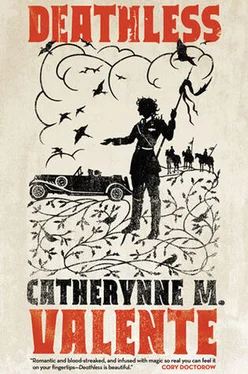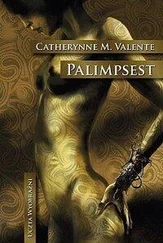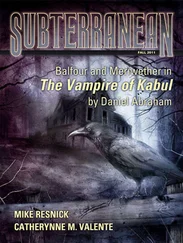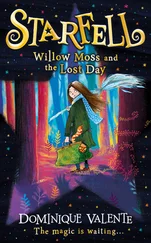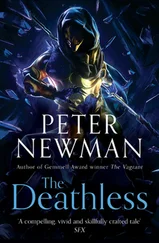“Drink, Ivanushka.” She clucked gently, like a mother, and put the mug to his lips. “Your lungs want vodka.” Obediently, he drank, and coughed, and drank once more.
Marya Morevna sank his clammy feet in her sister’s shallow tub. She held a handful of water to his nose and ordered him to breathe it in. Ivan spluttered, and gagged, but did it anyway, so accustomed was he now to her voice, her command. Finally, she made him stand. She reached into the foggy corner of the banya, knowing with all of her marrow that a long white birch branch would rest there.
But Ivan had drifted away into his fever, and slept curled on the floor of the banya like a hound.
Marya let go of the birch branch slowly. She watched him in the dark without a sound.
* * *
When the dawn roused the humble hut’s household to work, Marya and Ivan Nikolayevich found Anna once more atop her steel egg, sorting keys like an engine, too fast to see.
“Masha, my own, my littlest sister,” the shrike’s wife called down. “Take this with you.”
She tossed a key to Marya, with brass teeth. It glowed dimly in her hand, catching the sun.
“It is the key to our old house, on Gorokhovaya Street. But of course it is Dzerzhinskaya Street now. One of us should still live there. One of us should be young again.” Anna climbed down the grey side of her egg and held out her arms to her sister. When Marya stepped into them, Anna pressed her face to her sister’s breast, took up her hand, and began to dance with her, a gentle, slow circle around the little hut. Marya laughed despite herself, as she always had. She remembered, as if through a glass, having laughed like that, a lifetime ago. She kissed Anna’s forehead with passion.
“When our mother died,” Anna said, “the Housing Ministry sent the keys to me. I was the only one they could find. We keep our registrations current.” Then Anna kissed Marya on both cheeks. She smelled like iron and strength, and Marya Morevna held her tight.
PART 4
There Are No Firebirds in Leningrad
And always in the frigid, prewar air,
The lascivious, menacing darkness
There lived a kind of future clanging …
But then, you could hear it only softly, muffled,
It could scarcely cloud the soul
And it drowned in the snowdrifts along the Neva.
As in a mirror of appalling night,
A man thrashes like a devil
And does not want to recognize himself,
Along the legendary embankment
The real—not the calendar—
Twentieth Century draws close.
—ANNA AKHMATOVA
20
Two Husbands Come to Dzerzhinskaya Street
In a long, thin house on a long, thin street, a woman in a pale blue dress sat by a long, thin window, waiting for her punishment.
Neither fell nor fiery did it come. For one year, one month, and one day, it did not come. And forgiveness did not, either.
It was late spring when Marya Morevna slid her brass key into the lock of the house on Dzerzhinskaya Street, feeling it slide, too, between her own ribs, and open her like a reliquary full of old, nameless bones. The house stood empty. All the curtains—green-and-gold, cobalt-and-silver, red-and-white—had been yanked from their rods. Spiders’ webs made a palimpsest on the walls, endless generations of spiders weaving spider-tales into silk. The house seemed so much smaller than it had, darker, an old, hunched beast past its use. A hole had opened up in the roof, dripping rain and plum blossoms into the room which had once belonged to Marya and her parents. The downstairs stove stood silent and cold, full of old ash no one had taken out. Vacant room opened up into vacant room.
“The Dyachenkos lived in this room,” she said to no one. To Ivan Nikolayevich, she supposed, his hand proprietary on her back. It was all wrong. She was supposed to have found warmth here, like Ivan’s warmth. Life, and living. “They had four boys, all blond. I don’t remember their names. The father ate this awful pickle soup every night. The place just reeked of dill. And here—oh, the Blodniek girls! Oh, they were so beautiful. Their hair! How I wanted hair like that. Shiny and straight as wood. They used to read.” She turned to Ivan, her eyes hollow. “They used to read this fashion magazine. They each had their hour with it, every day. They memorized hemlines, and color palettes. Little Lebedevas! And oh, there, there the Malashenkos tied bunches of flowers to sell, and Svetlana Tikhonovna brushed her hair. Oh, why is no one living here? This was a good house! I had twelve mothers in this house, twelve fathers. I ate such sweet fish in this house.”
And Marya Morevna fell to her knees before the great brick stove in the empty kitchen. She did not cry, but her face grew redder and redder with the pain of her not crying.
“Zvonok,” she whispered to the floor. “Zvonok, come out.”
Finally, she curled up on the broken tile and went to sleep, like a ragged feral cat who has finally found shelter from the rain.
* * *
Ivan Nikolayevich went to the ministry that evening to ask them to pardon his disappearance from his camp posting with a long tale of illness and good service among the Buryatskaya province villages. He opened and shut the door with a kiss to Marya’s cheek that felt as alien to her as a tattoo pricked there. Kisses crushed, pulverized, obliterated, bit—they did not peck. They did not smack and then vanish in a second. The scent of new lime leaves and forsythia blew in after him to fill the space. Marya Morevna watched him go down the street. The blue-and-lavender evening threw sashes around him, and he passed by young men in black caps who leaned against the linden trees, playing guitars. Marya shut her eyes. When she opened them again, the guitars still twanged under the first faint stars and Ivan Nikolayevich had disappeared around a corner. She suddenly felt afraid to leave the house. What awful place waited out there, whose fountains spouted dead, tasteless water, whose tall houses had no names, no skin, no hair? This house, she knew. It stayed within her as it had always been, the architecture of her girlhood. The wood held the oils of her skin deep in its grain; the windows still bore the imprint—long gone, invisible—of her tiny nose. A ghost of the Marya without magic, the little girl who was not broken, not a soldier, not a wife. But Leningrad, Leningrad was a stranger. It did not even share a name with the city where she had been born.
The plumbing creaked to life, spitting brown chemical resentment into the sink. Marya waited, watching the baleful dragon-faucet spew its venom into the drain. It did not run clear, really, but it ran tepid, the color of weak tea. After a moment’s consideration, Marya Morevna took off her boots and placed them deliberately by the stove, where she had once shrunk to the size of a rolling pin. She rolled up the legs of her black trousers and slopped water onto the kitchen floor with cupped hands, having no bucket, kneeling to scrub with an oily rag and a few old newspapers she found stuffed into the stove. Vicious Spies and Killers Under the Mask of Academic Physicians! the newsprint said, and she crushed it into the floor until the ink ran with water and filth. Her creaky knee complained, popping against the tile, but gradually, she uncovered a single bleached and faded rose, the pattern she remembered in the once-tidy kitchen. I want to see those roses! Papa Blodniek had hollered at his daughters.
“What I would not give for one Blodniek sister to kiss me now, and light the stove with me,” Marya whispered. She scrubbed until her back wept and convulsed, giving up. She had been stabbed there, near her kidney, the night they lost the candlemakers’ district, and Koschei had howled at the sight of her blood, so like a wolf that the wolves in the wood had taken up the chorus. Marya lay flat on her stomach, waiting for her muscles to unclench and let her rise. The cool tile kissed her face. Outside, through the broken window, she heard a young girl laugh, a cream-colored, strawberry-ice kind of laugh. Her lover sang to her: W e’ll meet again in Lvov, my love and I …
Читать дальше
